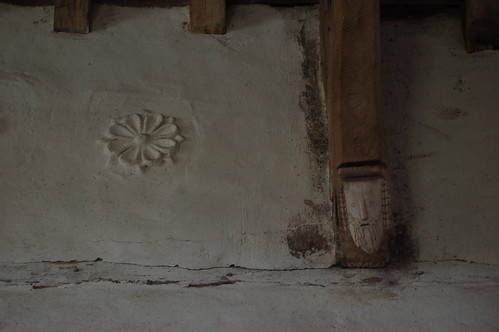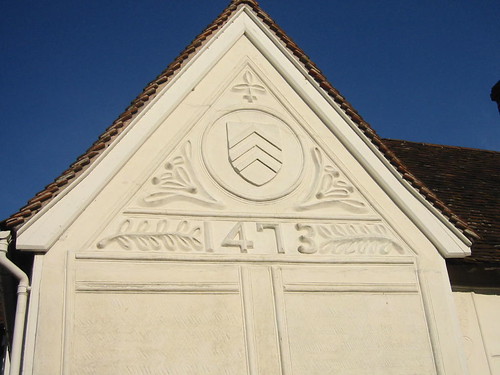| Green man, Clare, Suffolk. Modern example. |
Pargeting is decorative plaster work found mostly on the outside of buildings, and it is skilled work, hence the recognition in the surname. Although it is found throughout the UK pargeting mainly occurs in East Anglia. The first recorded use of the word was as early as 1237 when it was included in a description of work carried out on internal walls.
 |
| Langley Chapel, Shropshire. 17th century. |
Pargeting ranges from simple incisions to elaborate swags and floral sprays, to geometric designs, to symbolic features such as the Green Man, to figurative work and even full pastoral scenes. It can be either cut into a layer of plaster that has already been applied to a wall, or built up into low reliefs by the addition of some form of fibrous material that acts as a binder.
It mainly features on timber buildings and forms a weatherproof outer skin. Although plaster is not waterproof the application of pargeting prevented draughts and hence made homes warmer.
In the late 19th century there was a revival of the fashion and, in typical Victorian style, pre-moulded motifs could be bought to apply to smooth plaster base coats. The effect is much crisper than traditional work and frequently much simpler. Single motifs in large, blank areas, rather than overall patterning, denote later work.
 |
| Simple, early example. Also in Clare, Suffolk. |
Internally, the work is often called stucco, and the fashion for such designs was known as early as Roman times. So whenever classical design enjoys a revival it tends to bring decorative plasterwork back with it. The fine example below is from the 18th century Music Room in Lancaster.
Apologies to my regular readers. I've got a busy weekend coming up and I might not get back to visit your posts for a couple of days.

How interesting! Never heard the word 'pargeting'. Stucco I know, relief too...
ReplyDeleteBtw
Are you some kind of historian by profession? Your posts are always so interesting and educative! Thanks.
Hi Ritta
DeleteNo, I'm not a professional historian, though I have a degree in archaeology. I'm a writer by profession, ex-journalist, and now I do whatever anyone asks - website copy, press releases, brochures, etc. Currently working on a series of case studies.
There might well be one of your readers with the surname Pargeter, but my mind went to The Archers and Nigel- much lamented by me.
ReplyDeleteI really enjoyed your post today, its always good to learn something new. Have a great weekend.
ReplyDeleteI did not know that at all. Love reading your 5, they are always so informative. Thank you x
ReplyDeleteHow interesting! I had no idea about pargeting. In answer to your question I think of Nigel Pargeter...he used to be a character in The Archers!
ReplyDeleteI used to love looking for traditional pargeting on buildings when I lived in Suffolk but I had never linked it with the name before. Fascinating.
ReplyDeleteYou are so smart. I feel so proud of myself after reading one of your posts. It's as if I attended a class that day.
ReplyDeleteYou're too kind!
DeleteBeautiful. I must admit though my first thought was Nigel who fell off the roof in The Archers!
ReplyDeleteAs always, you post the most interesting posts, really enjoyed this one. I find names fascinating and often wonder at the origin.
ReplyDeleteThanks for another interesting post! The photo of Green Man reminded me of a dream I had long ago of a tall thin man dancing on a leaf...my Leaf Man Dream. When I met such a man in real life and told him about my dream he introduced me to Green Man.
ReplyDeleteAnother wonderful and informative post. I knew about some names being derived from occupations, but pargeting is a new term to me. Thank you. Have a good weekend.
ReplyDeleteI love pargetting. Visited a beautiful house near Colchester called Paycockes.
ReplyDeleteWonderful post. I love learning something new and I did today. Here's to Pargeter! Have a great week.
ReplyDeleteThat's truly interesting. I've never met anyone with the name Pargeter but if I do I will know their ancestry. Thanks for a great post :)
ReplyDelete